Nordic trade unions “too distant from rest of EU”
Who gains the most out of being a fly on the wall at the Council of Nordic Trade Unions congress in Oslo – the journalist or the social anthropologist? I suspect the latter, but since I am a journalist I will present the big news first: Iceland will host a tripartite meeting on green and just reform on 1 December 2023.
Why is that so important? Why is there spontaneous applause in the conference hall at the hotel in Holmenkollen when Prime Minister Katrín Jakobsdóttir delivers the news over a link from Iceland?
The explanation is to be found in the way the social partners are organised in Europe and in the Nordic region, where there is a gap – employers have no organisation to cooperate on a Nordic level. The hope is therefore that the Iceland meeting could be the beginning of something larger.
The Council of Nordic Trade Unions (NFS) is an organisation for cooperation between national trade union confederations in the Nordic region. Its members differ hugely – from the Swedish Trade Union Confederation with its 1.4 million members to Faroese Samtak with 6,000 members.
50th anniversary
NFS was founded in 1972 and celebrates its 50th anniversary this year. It was established because Denmark, Norway, Ireland and the UK had applied for membership in the EEC, which the EU was then called. There was a risk that Nordic union cooperation might splinter, while it was not at all clear how union cooperation would be organised in an expanded European community.
The result was the European Trade Union Confederation (ETUC). It gathered trade union confederations that took their inspiration from “socialism, economic democracy, Christianity or communism” as it says in a book that describes the founding of the organisation. Today, ETUC consists of 92 confederations from 39 countries with a total of 45 million members.
NFS represent 8.5 million of these or nearly one-fifth of the total. Thanks to the high level of trade union membership in the Nordics, NFS is three times stronger within ETUC than it would have been if you only considered the size of its staff.
European employers gathered in BusinessEurope, which represents national industry and employers' organisations across 35 countries, and in CEEP, which represents employers of public services.
While the Nordic confederations in NFS coordinate their policies within ETUC and other international organisations, there is no Nordic equivalent among employers. This means one of the three pillars which make up what is known as the Nordic model is missing on a Nordic level. Cooperation with governments, however, is comprehensive – both directly and through the Nordic Council of Ministers.
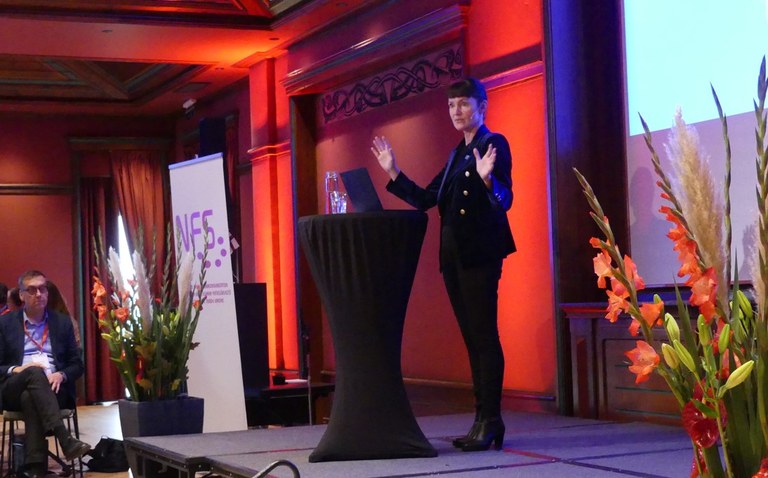
Kristina Hafóss is Secretary General for the Nordic Council of Minsters and represented the Nordic institutions.
Trade unions bemoan the fact that employers are missing from a Nordic level, especially when cross-border issues like climate change are being discussed.
If you want the green change to happen, things have to be fair, argues the trade union movement.
“As President Obama said, if all countries were a bit more like the Nordics we would have a better world. That is conditional on us having a Nordic model of course, with a very strong trade union movement and collective agreements. I believe that without this the climate fight will be hampered,” said the seasoned MEP (but brand new Swedish MP) Jytte Guteland (S) when asked to sum up why NFS is important.
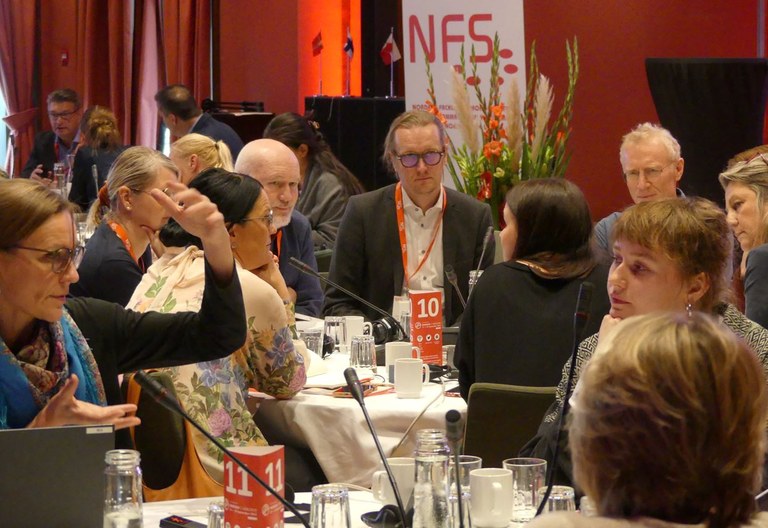
There is plenty of time for group work and conversations around the tables in the conference hall. Here, Professor of Nordic issues Johan Strang converse with the Swedish TCO leader Therese Nordström (facing away from the camera) and others.
But the Nordic model is also about culture and a unique way of working together and solving problems. This is where the social anthropologist comes in. And to avoid any misunderstandings: The fly on the wall is a metaphor – there is nothing secret going on at the NFS congress. I have been invited as a member of the press and simply act as a hobby anthropologist too.
What strikes me is how informal the congress is and how confederation leaders unquestioningly join in with all activities proposed by the NFS secretariat. It is made up of only four people led by Magnus Gissler, and it has also got a former secretary general, Loa Brynjulfsdóttir, to be the congress moderator.
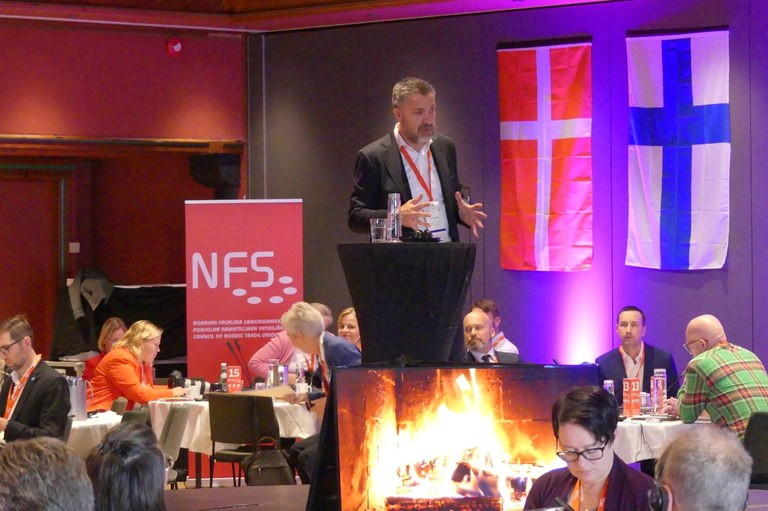
Luca Vinsentini, the ETUC Secretary General, speaking by the "campfire" in the middle of the conference hall during the NFS congress. Most of the delegates knew that he he has also published poetry, both in Italian and English.
In order to energise the congress, several techniques are being used – like audience response systems allowing the delegates to guess which of the three claims made by speakers is false. Meanwhile, a digital bonfire has been created in the middle by arranging three TV screens in a triangle.
Every so often, José Peréz Johansson from the secretariat shouts: “Workgroups now!” and everyone eagerly enters discussions around the tables, writing down keywords on flip chart paper before pinning them to the wall.
“There is a big difference between ETUC meetings and this congress, where the use of new methods turns it all into a kind of classroom. This could never happen at ETUC, where you get long speeches, often prepared in advance, but not from the French or Italians. They deliver loooong introductions and descriptions of how they view things, and perhaps at the end, you get a proposal for what ETUC should do for us. There is a major cultural difference here,” says Ragnhild Lied, head of the Norwegian Unio trade union.
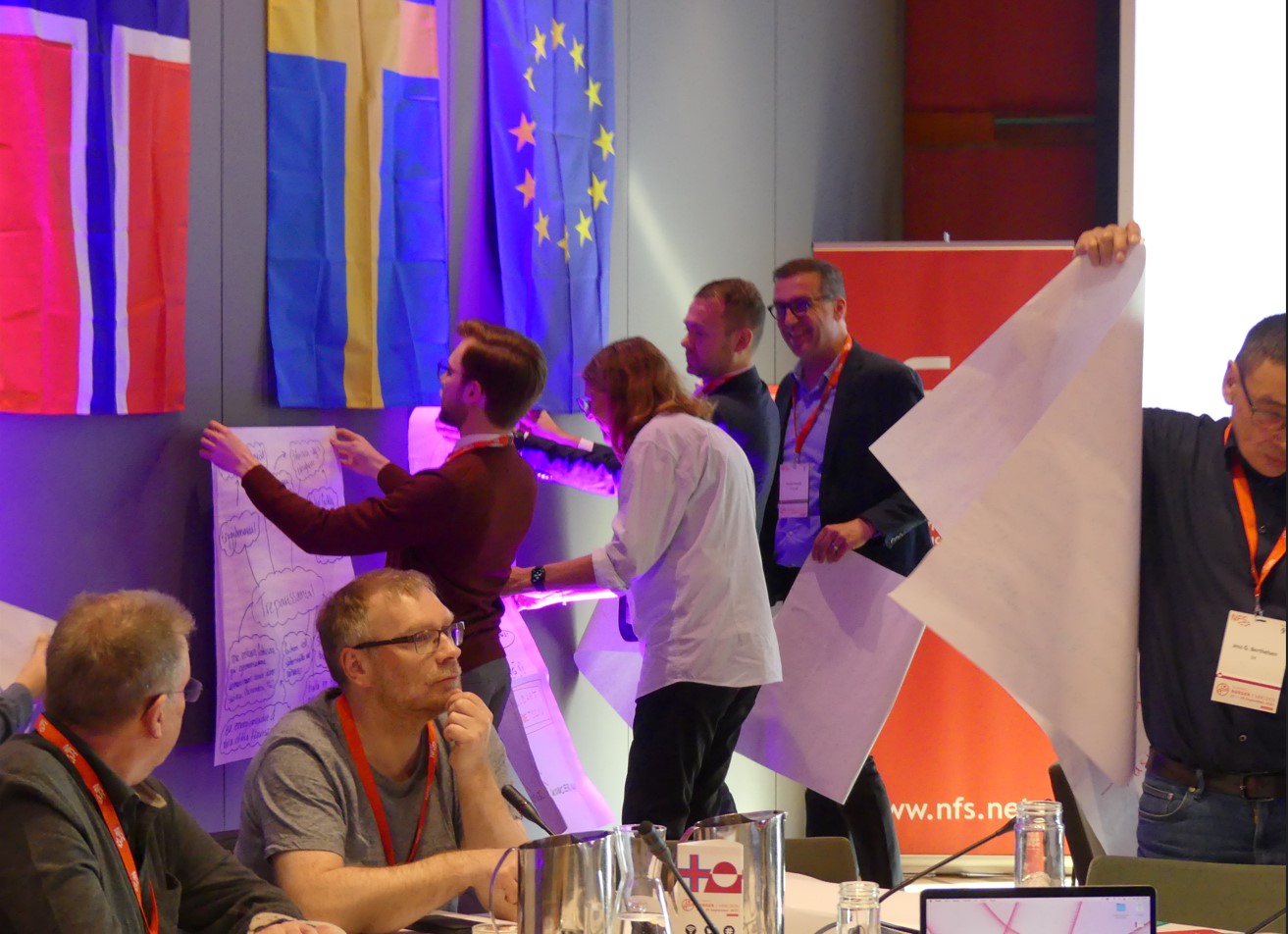
The results from group work is hung on the wall.
Loa Brynjulfsdóttir jumps between speaking Danish, Swedish and Icelandic – or English when introducing the international guests.
The walls around me are adorned with the Nordic flags, except Åland’s, as their trade unions do not have their own confederation (they are part of the Finnish confederations). Here is also an EU flag, which makes invited guest Jesús Gallego sit up and take notice.
“It surprises me to see the EU flag on the wall. Is this a joke? Will it be taken down and burned on the final day?” he jokes.
The NFS has had a problematic relationship with ETUC in recent years mainly because of the opposition from Danish and Swedish trade unions to minimum wages. It culminated with the Swedish Trade Union Confederation, LO, in late 2021 deciding to freeze relations with ETUC and stop paying their membership fee.
“We cannot allow them to represent us, we must speak for ourselves,” LO’s contract secretary Torbjörn Johansson said in a comment at the time.
In early 2022 the hatchet was finally buried and Swedish LO resumed paying their membership fee. Claes-Mikael Ståhl, the ETUC Deputy General Secretary, sums up the cultural differences like this:
“We in the Nordic region like to write long letters, while you in the south of Europe are more theatrical.”
Jesús Gallego, however, cannot help but be a little frustrated with the Nordic countries’ relationship with the EU.
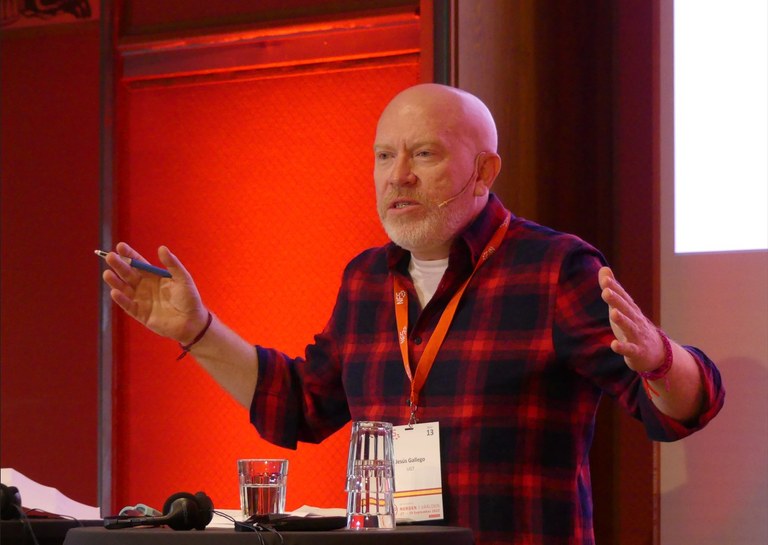
Jesús Gallego, International Secretary for the Spanish trade union confederation UGT.
“There is this feeling that the Nordics have nothing to do with the EU. And this is not about the fact that some of the countries are not members. It is more about considering the EU to be an enemy rather than a partner. It seems some of your politicians, regardless of political affiliations, feel the need to present some kind of criticism of the EU in order to appear strong.
“All this also happened before the debate around minimum wages. You are, in other words, no ‘fans’ of the EU. But think about Greece – how big a fan was that country after the 2008 financial crisis? Or the Spanish steelworkers who lost their jobs when Spain joined the EU, or Italy’s voters who recently sent a strong message to the EU. They are not ‘fans’ of the union either.
“We all have had issues with the EU, but why do we then think that it is the Nordic region that has a problem with the EU? Is it because you are so different from us? We have a Spanish saying along the lines of ‘we are all so very different that we begin to resemble each other’.
“So perhaps that is what is happening: You are very different, but that does not make you more different than us.
“The greatest mistake we can make is for us to believe you were wrong and for you to believe that we were wrong in the debate over minimum wages. We were fighting the same fight. We all wanted better conditions for our members, but we believed it was better to have that tool while you believed it was better not to,” says Jesús Gallego.
- Three trade union leaders
-
From rigth to left: Susanna Gideonsson, LO, Sweden, Kristján Þórður Sveinbjarnarson, ASÍ. Iceland and Peggy Hessen Følsvik, LO, Norway.
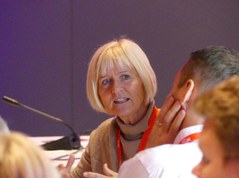
 Follow us on Facebook
Follow us on Facebook
